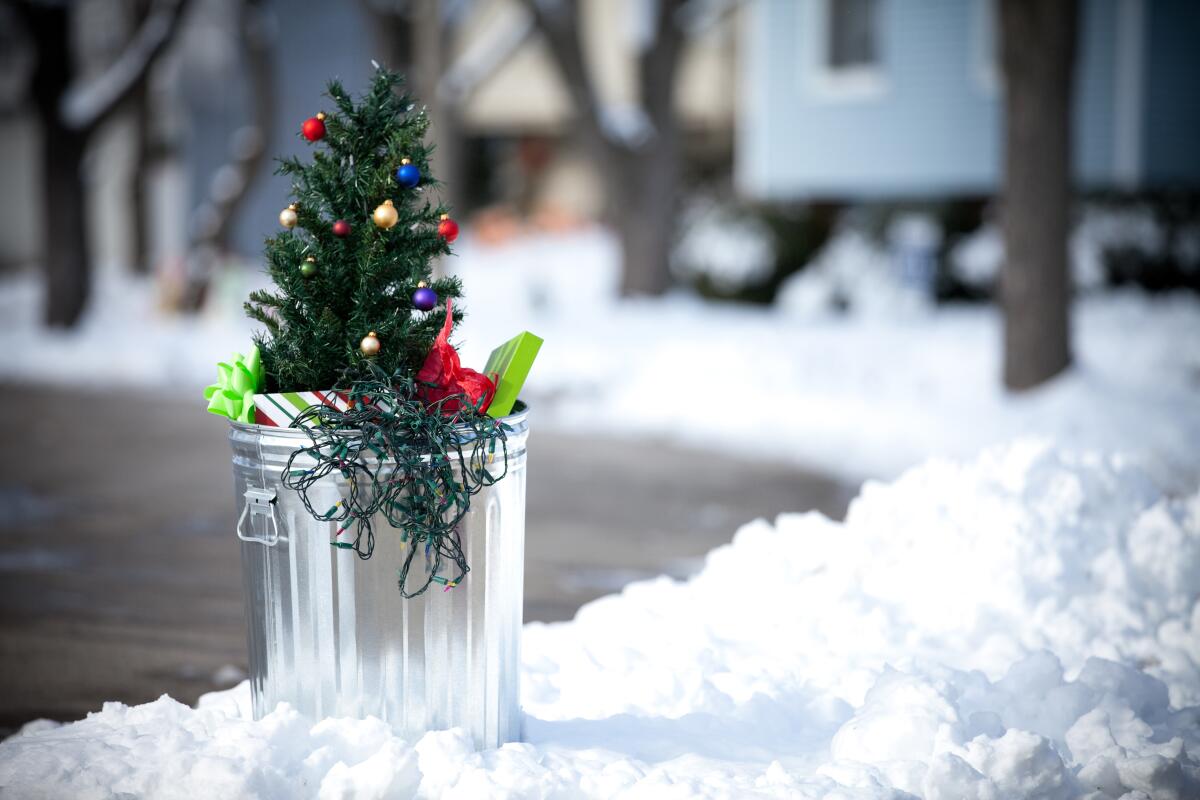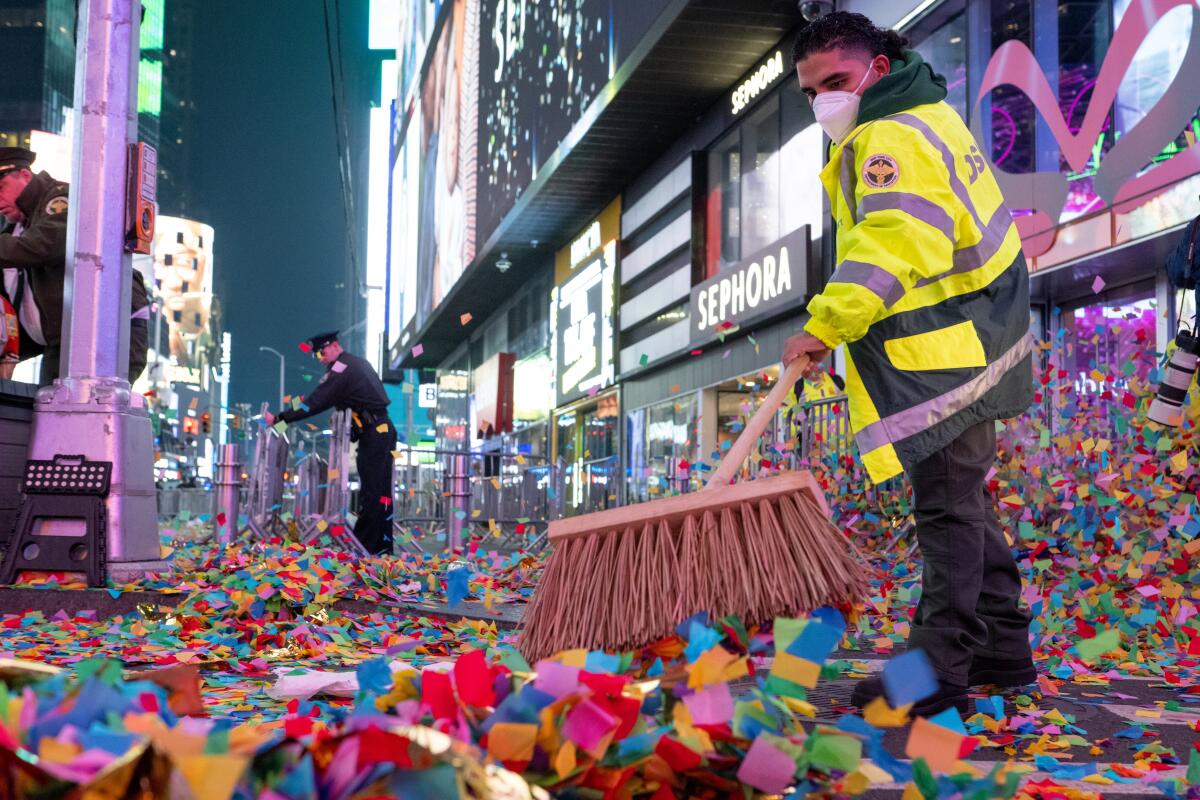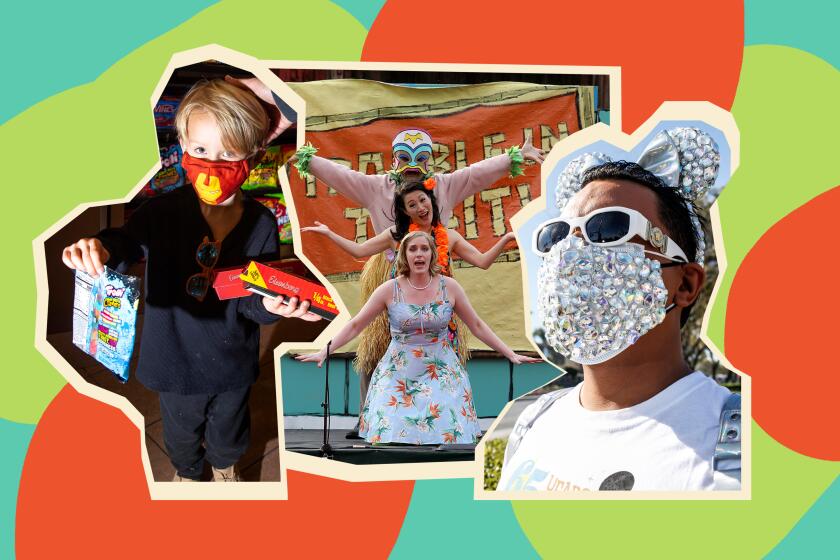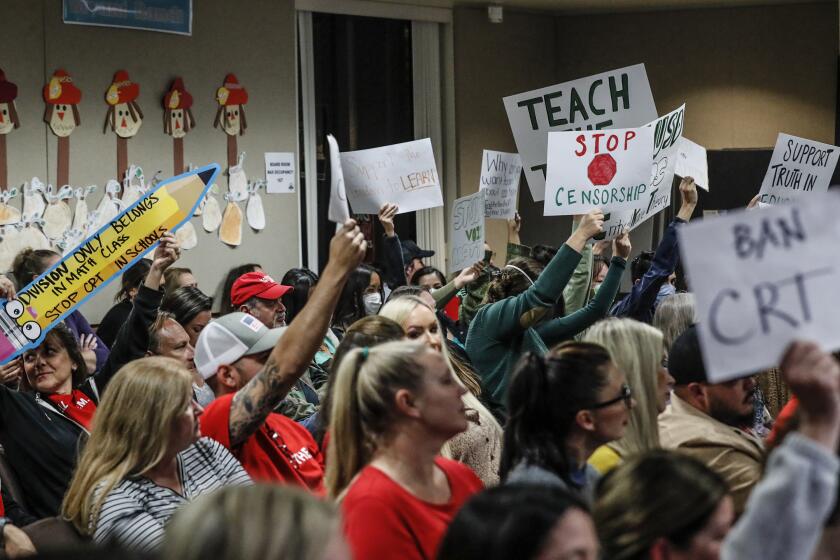Column: Here’s my New Year’s resolution and yours: Fix your selective amnesia

- Share via
Like many Americans, I dream of spending the first days of the new year in personal stock-taking and calm cogitation, of sipping hot tea and making notes in a pristine journal as I contemplate how this year can be better than the last.
Instead, I inevitably spend them taking down the damn holiday decorations, yelling at my kids to help me take down the damn holiday decorations and contemplating the insidious nature of holiday amnesia.
There is always a point when, up to my knees in bins and crumpled newspaper, I vow that I will never do this again. Christmas is fine, but does it require a literal host of ambient angels? This many Christmas coffee mugs? Channeling Jennifer Saunders’ Edina in “Absolutely Fabulous” (as I often do when stressed), I swear that next Christmas will be nothing but “surfaces, darling, surfaces,” with perhaps our most minimalist crèche and a lone sprig of pine to invoke the season.
I am lying, of course. The ensuing months will wipe away the memory of this messy, mind-numbing task, and come December, I will view these hated bins with giddy anticipation.
It’s kind of like childbirth. Or election day. In an excerpt from her new book recently published in the other Times, columnist Heather Havrilesky argued that marriage, too, is dependent on a certain amount of self-administered amnesia — how else could a person live in perpetuity with the annoying tics and traits of another?
I know Heather well enough not to argue. As boiled down to the old advice to “accentuate the positive and eliminate the negative,” amnesia has helped many of us to weather all sorts of personal and collective crises. The mind’s ability to mute memories of exhaustion, irritation, pain and fury while focusing on small gains and the possibility of greater joy is precisely what allows us to move past failure; it is certainly the only reason anyone gets more than one tattoo, puppy, child or ice skating lesson.
This is never more true than at the beginning of a new year. Jan. 1 is not the beginning of a new year for everyone, but it is a generally acknowledged moment of the old giving way to the new and all that implies: that coveted clean slate, that chance to start over.
The reality of 2021 was both gentler and messier than the apocalypse fiction we consumed. But those stories taught us we can survive anything
The past two years have left many wary of making predictions or plans. That there will be fresh hell in 2022 seems inevitable; what it will be precisely is anyone’s guess, though we should definitely be paying more attention to all the attempts to circumvent democracy currently happening at federal, state and local levels.
In fact, if we are going to make a resolution or two, there is no better place to begin than our underexamined relationship with amnesia, holiday-related and otherwise.
There’s nothing wrong with putting the past behind us, but we can’t wish it into a cornfield. While positive thinking may help get the house clean, it doesn’t end a pandemic. COVID-19 knows neither grief nor exhaustion. It only “knows” it needs human bodies to survive, and it will do everything it can to sidestep every measure we take, including vaccines. So we have to keep taking all the measures — vaccines, boosters, hand-washing, social distancing and masks, masks, MASKS.
Likewise, many of us began last year believing that the defeat of Donald Trump would act like the snow falling on the poppy field in “The Wizard of Oz”; the country would awake as if from a hateful trance. As inauguration month dawned, we conveniently forgot that Trump did not invent any of the -isms — nationalism, isolationism, racism, sexism, lethal capitalism — or the very unfortunate human desire to smear those who do not think as we do. He merely leveraged these things, offered them clear passage, and we did the rest.
We forgot that this country has been hugely divided from its inception. History alert: Not every colonist wanted to be part of an independent country, just as not every member of the “greatest generation” wanted the U.S. to enter World War II. Back in the early 2000s, having helped elect our first Black president, many white people “forgot” that racism was still doing its brutal, bloody work, just as the increasing presence of women in positions of power allowed many to “forget” that sexual harassment is still viciously omnipresent.

For two centuries, there has been a level of collective (and enforced) amnesia about how this country was built — that is to say, in large part, on slavery and the continual subjugation of millions based on race, class and gender. But refusing to acknowledge our actual history does not make us “great.” It only highlights and deepens our sense of shame, an emotion that sometimes finds release in unpredictable, destructive ways. Teaching our children that fact is fiction, that up is down, that the past doesn’t matter, is not a legitimate cultural narrative: It’s totalitarianism.
An Orange County school district’s debate over critical race theory exemplifies how a hard-to-define academic concept has become a proxy for uncomfortable conversations about racial injustice in the U.S.
This is what we saw after the violent attempt to overturn a free and fair election a year ago; many elected officials who were there at the time, huddling under desks for fear of their lives, very soon pretended it didn’t happen. That we didn’t see what we all saw. Which is not amnesia but straight-up lying, and this also we must not forget. Ever.
Nor can we afford to forget that weather, though not controllable, can be and has been affected by our actions. Here in California, a few days of good rain and a currently healthy snowpack (go snowpack!) should not erase concerns about global warming and, alas, the drought. Am I tired of seeing headlines — written by my own beloved colleagues! — that pivot on a “but”? “Southland sees record rain but drought is not over”? Yes, I am, but … a lot of truth can be found in a conjunction.
It’s a lot. Along with the big three — COVID, climate and coup-plotting — there are countless other problems (Spielberg’s “West Side Story” was a box-office bomb?!) that we’d love to see resolved in 2022. So what do I want the new year to bring?
Well, first of all, I’d like for us all to stop acting like the new year is an actual entity that can bring us anything. Sure, it’s fun to talk about 2020 like it was a dumpster-fire demon sweeping in from some part of the multiverse, with fast-talking sidekick 2021 leading its own, even crueler (because occasionally more hopeful) sequel. But that’s crazy. Just as we create the concept of years, so do we define them. So the question is not what will 2022 bring to us, but what will we bring to 2022?
Will we sigh and complain because instead of contemplating a brand-new year, with all its pristine promise, we’ve got to take down the damn holiday decorations? Or will we just take a deep breath, find a bunch of old newspapers and get the job done?
And if a few of those Christmas coffee mugs make their way to Goodwill, well, by next year, no one will even remember we had them.
Most historians will see the attack as one prong of a multifaceted coup attempt. But a revisionist history is also sure to appear, making the insurrectionists into patriots.
More to Read
The biggest entertainment stories
Get our big stories about Hollywood, film, television, music, arts, culture and more right in your inbox as soon as they publish.
You may occasionally receive promotional content from the Los Angeles Times.














